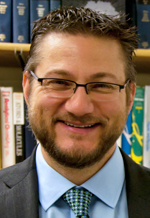

Main navigation | Main content

Professor Mark Distefano has been named a 2014 American Chemical Society (ACS) Fellow. Fellows are honored for their outstanding contributions and service to chemistry, science, the profession, and the ACS. He will be honored along with the other 99 new Fellows at the fall national ACS meeting in San Francisco.
Distefano has been a professor in the Department of Chemistry since 1992. He teaches chemical biology and organic chemistry. He has earned top university teaching honors, including being named a Distinguished McKnight University Professor, and receiving the Horace T. Morse-University of Minnesota Alumni Association Award for Outstanding Contributions to Undergraduate Education and the George W. Taylor/College of Science & Engineering Alumni Society Award for Distinguished Teaching. His honors have earned him induction into the university's Academy of Distinguished Teachers.
Distefano has an exemplary service record both within and outside the ACS. He has served as an elected officer in both the ACS Divisions of Biological Chemistry and Organic Chemistry. He has also served as a Project SEED mentor, as a panel member for the Division of Minority Affairs to promote recruiting of Native Americans, and, currently, as a member of the editorial Advisory Board for Bioconjugate Chemistry. He has served as a session chair for numerous symposia at ACS meetings. His most important contribution to the ACS has been his work on the Multidisciplinary Programming Planning Group (MPPG), where he has served since 2007 including as Chair in 2012. MPPG is responsible for choosing the themes and thematic organizers for national ACS meetings and assisting with multidisciplinary programing.
Distefano is actively involved in a variety of service activities outside the ACS as well. He is currently regional editor for Bioorganic Chemistry and a member of the Advisory Board for Organic Chemistry Insights. As a member of the American Peptide Society, he served on its nominating committee. He was a chair for the Bioorganic Chemistry Gordon Research Conference and a session chair for a Federation of American Societies for Experimental Biology meeting on protein lipid modification. At the University of Minnesota, he is the principal investigator of an Nation Institutes of Health-funded training grant that focuses on the chemistry-biology interface.
Distefano's research is at the interface of chemistry and biology, focusing on understanding how proteins accelerate chemical reactions and how proteins recognize other molecules with high specificity, which is useful for drug design and biotechnology applications. He is a world leader in the design of protein-based catalysts where synthetic molecules are linked to protein structures found in nature. He was the first researcher in the field of semisynthetic enzymes to obtain a three-dimensional structure of such an enzyme. His work in a different area of protein chemistry, prenylation, is providing important clues for how to design more effective anti-cancer compounds. He has used his knowledge of protein prenylation to develop a new method for using enzymes to modify proteins, which has tremendous implications for a host of applications in biotechnology and nanoscience.